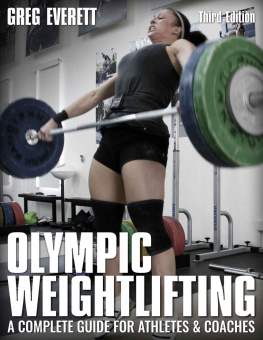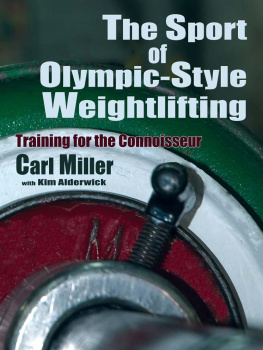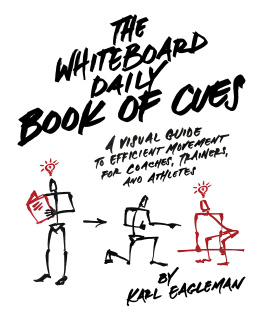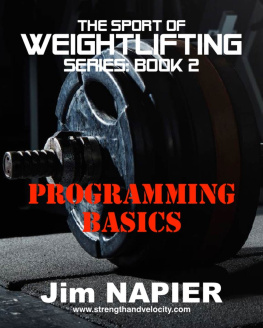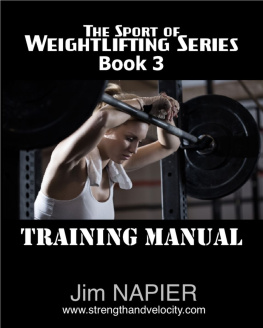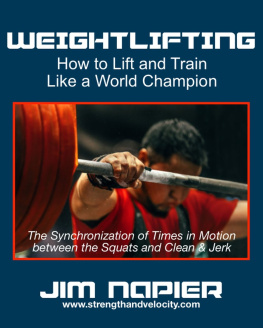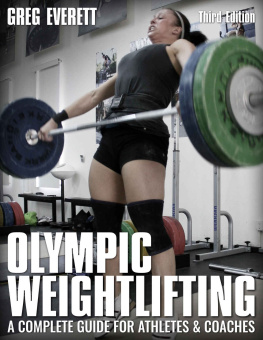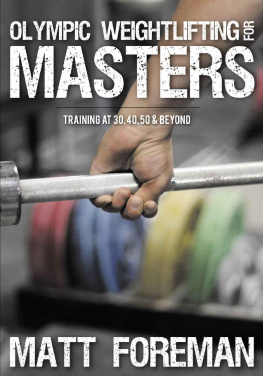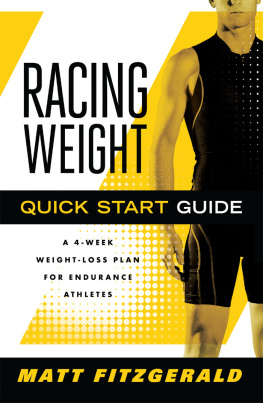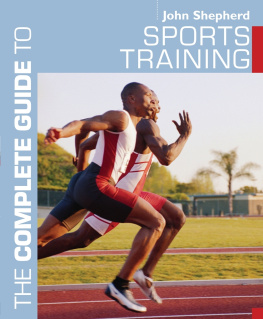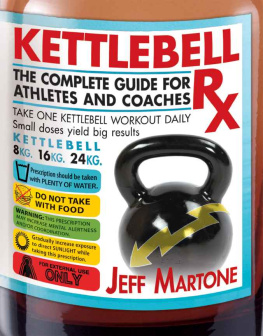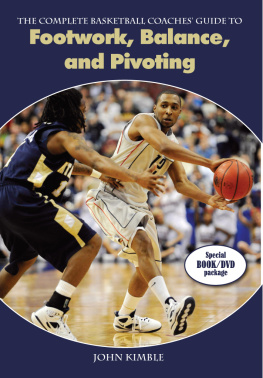Olympic Weightlifting
A Complete Guide for Athletes & Coaches
Third Edition
Greg Everett
Catalyst Athletics
.
2016 Greg Everett
Published by Catalyst Athletics, Inc. All rights reserved. No part of this book may be reproduced in any form without prior written consent from the publisher, with the exception of brief quotations in articles or reviews.
Catalyst Athletics, Inc
www.catalystathletics.com
Anatomical illustrations by Glen Oomen
Catalyst Athletics, Inc and Greg Everett advise that the exercises and techniques described in this book can be strenuous and may not be appropriate for all individuals, and do not make any claim to the safety of said exercises and techniques. The nutrition information herein exists for example purposes only and in no way represents a prescription for any individual. It is strongly recommended that the reader consult a physician before engaging in any of the activities or practices illustrated or described herein. Catalyst Athletics, Inc and Greg Everett disclaim any and all liability for any injury sustained or condition arising from the performance of any of the exercises or practice of any of the nutrition ideas described in this book.
Contents
Acknowledgments
I feel compelled to first recognize the achievements and contributions to weightlifting of the coaches and athletes who have come before me. My respect for these individuals is limitless, whether or not we agree on any given topic, because of their passion, commitment, and their work in and out of the gym that has propelled the development of training and coaching methodology. Without these individuals, I would not have had the opportunities that have allowed me to reach this point.
Coach Mike Burgener has been particularly important to my education as my first weightlifting coach and mentor. Without him and his generosity, its likely this book wouldnt exist. I would also like to thank coaches Bob Morris, John Thrush, Jim Schmitz and Bob Takano in particular for the things Ive learned from them and their support in various capacities of both me and this book since its original publication, although many other coaches have been helpful and supportive along the way. I hope you know who you are.
Of course, thank you to all of my weightlifters, on whom I get to experiment and through the coaching of whom Im able to continue to learn, as well as for allowing me to use photographs of you throughout this book.
My wife Aimee deserves a great deal of gratitude for her support of my absurd choice to try to make a living on the creation of educational material for an obscure and impoverished sport, and for helping me in too many ways to enumerate to accomplish what I have. I also want to thank my daughter Jade for enduring numerous weightlifting competitions and many hours in the gym, and for understanding my often long work hours.
Finally, thank you to Robb Wolf and Nicki Violetti of NorCal Strength & Conditioning for bringing me into their gym years ago and convincing me I could in fact earn a living doing what I love.
Introduction to the Third Edition
Its been eight years since I originally released Olympic Weightlifting: A Complete Guide for Athletes & Coaches . In this time, it has become and remained the most successful book on the topic in the world. However, as a coach, I am continually learning through my work with my weightlifters and interactions with other successful coaches, and as a consequence, my approaches to various elements of lifting or coaching, my thoughts on certain elements of program design and training, and my opinions regarding the management of lifters of all types are somewhat fluid. Additionally, in these years Ive been able to learn how well information in the previous edition was conveyed to readers, where confusion was common, and what new popular information and practices need to be addressed, and have made appropriate changes to improve clarity in these instances.
This newest edition reflects these alterations, none of which are particularly dramatic and certainly not contradictory to anything in previous versions. Additionally, I have take advantage of the opportunity to improve the way the information is organized and presented to maximize its utility and accessibility. I have added significantly more information, with new chapters as well as expansion of existing material, and components to improve the books use as a reference, such as an index, a glossary, more tables and additional section headings. Finally, photographs and illustrations have been improved to ensure the best possible communication of the concepts in the text.
Im incredibly grateful to all of the readers of this book who have supported me and Catalyst Athletics through the years and allowed us to grow into such a dominant source of information and education for the sport of weightlifting. I hope that my continued efforts to provide more and better information, like this new edition of the book, will be adequate expressions of my gratitude.
Greg Everett, January 2016
How to Use This Book
The size of this book may be daunting to some readers, but I have gone to considerable lengths to present the material in an organized, rational fashion, as well as include helpful summaries and simplifications along the way, to make it as accessible and useful as possible to readers of all levels of experience. The book has changed significantly since its original release in 2008 to continue improving upon this intention.
The book as a whole is a single continuous progression, beginning with a foundation of fundamentals and building to the finer details of execution and principles. As much as possible, I have tried to avoid redundancy by presenting universal principles at a single point and then expanding upon them in ways specific to a given lift later, and later sections often build on information presented in preceding sections. Its consequently recommended that the book be read start to finish initially, and then specific sections returned to as desired or needed.
I have provided summaries throughout the book as a way of concisely presenting the most important points in each section for two basic reasons: First, to help reinforce what has been read, and second, to provide a simplified system for the less experienced lifter or coach to focus on practical information that can be implemented immediately. This progression of summaries can be found in its own section at the end of the book for quick reference.
If youre a beginner, either as a lifter or a coach, you can rely primarily or exclusively on the summaries of each step in the progression to get simple and clear instructions on what exactly to do and how to do itthese summaries are numbered sequentially from start to finish. Later, you can return and delve deeper into the details as your increasing experience improves your ability to understand and apply more of the information in a useful manner.
The table of contents and index can be used to locate specific sections or topics in the book, and a glossary is also provided in the back of the book for quickly looking up terminology.
Very often the book addresses the coach specifically despite being intended for both coaches and athletes. If you are an athlete training without a coach, dont make the mistake of thinking youre being neglectedyou are your own coach.
Please note that while photographs are included to help illustrate and clarify certain points throughout the book that its extremely difficult, if not impossible, to capture intended movements and moments perfectly. Additionally I have used photographs of actual lifts in training as much as possible, and of many different athletes, to best represent reality. Please rely on written descriptions as the final word in cases in which photographs may appear to not perfectly represent the associated explanation.

